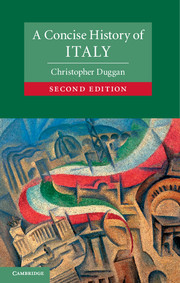Book contents
- Frontmatter
- Contents
- List of Illustrations
- List of Maps
- List of Tables
- Preface
- Chronology
- Introduction
- 1 The geographical determinants of disunity
- 2 Disunity and conflict: from the Romans to the Renaissance, 400–1494
- 3 Stagnation and reform, 1494–1789
- 4 The emergence of the national question, 1789–1849
- 5 Italy united
- 6 The liberal state and the social question, 1870–1900
- 7 Giolitti, the First World War, and the rise of Fascism
- 8 Fascism
- 9 The Republic
- Bibliographical essay
- Index
Introduction
Published online by Cambridge University Press: 05 June 2014
- Frontmatter
- Contents
- List of Illustrations
- List of Maps
- List of Tables
- Preface
- Chronology
- Introduction
- 1 The geographical determinants of disunity
- 2 Disunity and conflict: from the Romans to the Renaissance, 400–1494
- 3 Stagnation and reform, 1494–1789
- 4 The emergence of the national question, 1789–1849
- 5 Italy united
- 6 The liberal state and the social question, 1870–1900
- 7 Giolitti, the First World War, and the rise of Fascism
- 8 Fascism
- 9 The Republic
- Bibliographical essay
- Index
Summary
In the late spring of 1860 Giuseppe Garibaldi, a flamboyant irregular soldier, who had spent much of his life abroad fighting as a guerrilla leader, set sail for Sicily from a port near Genoa. On board his two small ships was a motley collection of students and adventurers, many of them barely out of their teens. Their mission was to unify Italy. The prospects for success seemed limited: the group was ill-armed, and few among them had any experience in warfare or administration. Moreover, they did not constitute a promising advertisement for the nation-to-be. Among the thousand or so volunteers were Hungarians and Poles, and the Italian contingent included a disproportionate number from the small northern city of Bergamo. However, in the space of a few months they succeeded in conquering Sicily and the mainland South from the Bourbons; and in March 1861 Victor Emmanuel II, King of Piedmont–Sardinia, became the first king of united Italy.
The success of Garibaldi and his ‘Thousand’ was both remarkable and unexpected; and when the euphoria had died down, many sober observers wondered whether the Italian state could survive. France and Austria, the two greatest continental powers of the day, both threatened to invade the new kingdom, break it up, and reconstitute the Papal States, which had been annexed by Victor Emmanuel in the course of unification. A much more insidious long-term threat, however, to the survival of the new state, was the absence of any real sense of commitment or loyalty to the kingdom among all except a small minority of the population. The country’s new rulers justified their demands for heavy taxes and military service, the often harsh repressive measures, and the unfamiliar institutions, by appealing to the sanctity and inviolability of the Italian ‘nation’: but for the overwhelming mass of Italians, the ‘Italian nation’, indeed ‘Italy’ itself, meant almost nothing.
- Type
- Chapter
- Information
- A Concise History of Italy , pp. 1 - 8Publisher: Cambridge University PressPrint publication year: 2013



